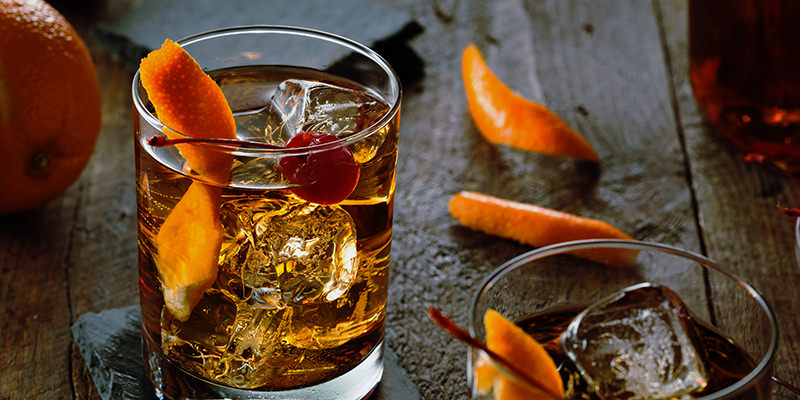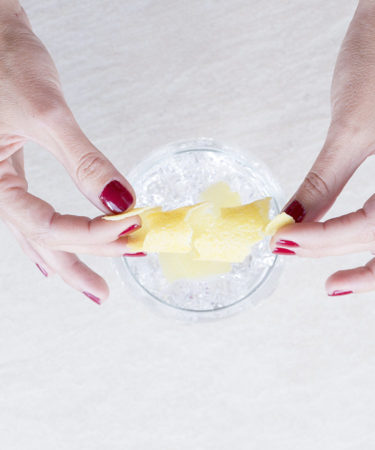Have you ever been at a bar and noticed your bartender twisting a piece of citrus rind before they drop it into your drink? It’s called “expressing” the peel, and it’s not just for show.
Citrus is a powerful flavor and aroma agent, and an important player in several cocktails, from classics like the Old Fashioned to wacky original cocktails. Expressing the orange peel lets fragrant oils loose. Jen Marshall, former bartender and current Brand Ambassador for Reyka Vodka, explains, “Orange peels are expressed to float the citrus oils on the drink, both for flavor and smell. [But for] aroma most importantly. When you bring the glass to your face, it has a huge effect.” Derek Brown, Head Bartender at The Underdog says that expressing the peel is not only important in that it distributes the citrus oils atop the drink and improves the nose, but because it “provides perceived acidity.”
Expressing the peel also gives a drink the benefit of citrus flavor without making the cocktail a sugar bomb, like adding lemonade or orange juice would. As Jacob Tschetter, Head Mixologist at The Jeffrey puts it, “The reason I [express citrus peels] is to enhance or balance out a cocktail’s citrus notes without adding sweetness. In fact, if you’ve ever licked your hand after peeling an orange, you’ll notice how bitter it is…you get all the aromatics of an orange without over sweetening your drink.” He points out that orange peel is actually a great bittering agent, but balance is key.

Chaim Dauermann, Head Bartender at The Up & Up echoes Jacob’s statements, emphasizing that it’s all about moderation. “Bartenders just walk around spraying excessive amounts of citrus oil on everything. The most significant instance of this happening is when a bartender serves an Old Fashioned with both a lemon and an orange twist…it must be done delicately. If you are going to double up on peels in an Old Fashioned, it’s best to go with small strips of peel and express minimally.”
Ralph Ng, former bartender at Evelyn Drinkery and current bartender at Hilo Tavern in Hawaii, says that when it comes to making cocktails, the devil is in the details: “Cocktails have been evolving into the level of culinary expertise, so those simple touches – flavors, aromas, fusions – make a huge difference”
Now, what about those bartenders who light the peels on fire? It’s not a run of the mill trick, but you’ll certainly see it from time to time. “Good cocktail bars don’t do that,” Derek insists. “It is mostly for flare. In my opinion, it overwhelms the nose of the drink. You’ll never see it in my bar.” This is particularly pertinent when it comes to a more delicate drink like a gin & tonic – you don’t want to overwhelm that sucker.
Once the peel is expressed, is it used in the cocktail itself? Actually, this one seems to be played on a drink-by-drink basis. So if you notice a burst of fragrant citrus in your drink, but a peel is nowhere to be seen, you know why. Thank (and tip!) your bartender.
